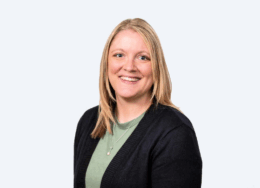Episode 277 10 Sep, 2025
When to Hire a CFO vs. Accountant for Your Practice with Carter Freeman
-
 With Carter Freeman
With Carter Freeman

Do you really need a CFO, or is your accountant enough?
If you’re a group practice owner wondering whether your current accountant is giving you the insight you actually need to scale, this episode is for you. I sat down with Carter Freeman to talk about the evolving role of CFOs in therapy practices, and how CFO services – especially fractional CFO services – can help you grow smarter, not harder.
We dig into the real differences between a CFO vs. accountant, why clinical leaders need more than just number crunching, and how financial strategy impacts everything from hiring decisions to clinical outcomes. If you’ve ever thought, “My accountant doesn’t do that,” this conversation will open your eyes.
Here’s what we cover in this episode:
- The key differences between a CFO vs. accountant – and why your practice likely needs both at different stages
- Why fractional CFO services might be your best next hire (even if you’re not ready for a full-time CFO)
- How CFO services help align financial decisions with clinical growth and long-term sustainability
- Real-world cash flow management techniques that Carter uses with growing group practices
- What accountants for therapists should be doing – and where their role stops short of strategic leadership
Whether you’re planning to expand, hire nonclinical staff, diversify services, or even prep for a sale, understanding the role of a CFO is key. Carter and I break down the signs that it’s time to bring one in and how to leverage financial leadership that moves your practice forward.
Listen to the full episode now to learn how CFO services, fractional CFO services, and smarter cash flow management techniques can elevate your group practice beyond basic accounting.
LINKS:
Need extra support? Join The Exchange, a membership community just for group practice owners.
The Group Practice Exchange Programs + Courses
The Accountability Equation™ Quiz
The Accountability Equation Book
Group Practice Forecasting Support GPT
CONNECT WITH MAUREEN HERMANN & THE GROUP PRACTICE EXCHANGE:
CONNECT WITH CARTER FREEMAN:
SPONSORS:
TherapyNotes: An EHR software that helps behavioral health professionals manage their practice with confidence and efficiency. Go to therapynotes.com/r/thegrouppracticeexchange for two free months!
GreenOak Accounting: An accounting firm that specializes in working with group practices. Mention TGPE to get $100 off your first month!
Transcript: Carter Freeman
[00:00:00] Maureen Hermann: Hey everyone. Welcome back to another episode of the Group Practice Exchange Podcast. Today I have Carter Freeman with me, and we’re gonna be talking about the evolving role of having a CFO in your group practice. What that means, how that’s different from having an accountant, and why it’s beneficial for you to have one.
[00:00:19] Maureen Hermann: Welcome to the Group Practice Exchange Podcast, where we talk about all things related to group practice ownership. I’m your host, Maureen Hermann.
[00:00:30] Maureen Hermann: Therapy Notes is changing the game for mental health professionals. It’s an all-in-one EHR practice management and billing platform that actually makes running your practice easier. From secure client messaging and scheduling to notes and billing, everything’s in one place and their 24 7 customer support is truly unmatched.
[00:00:46] Maureen Hermann: You get a real person, a live human every single time you call their latest update. Therapy Fuel is a total time saver. It’s a built-in AI tool that helps you get through documentation faster. Think progress notes from transcripts or summaries, contact notes created from secure messages. And automated summaries of client history forms.
[00:01:05] Maureen Hermann: Users are already saying that it’s saving them hours every week. Other new features worth noting is automated recurring payments for clients, electronic billing for secondary insurance, and a growing outcome measures library to make tracking progress even smoother. If you’ve been on the fence, now’s the time to try it.
[00:01:22] Maureen Hermann: Head over to therapy notes.com, click start My Free trial, and use the promo code TGPE to get your first two months for free. See why so many therapists trust therapy notes to support their practice, including me. Struggling with your practice’s finances. Let me tell you about Green Oak Accounting. Green Oak is the industry leader in mental health accounting, and they know exactly what it takes to help your practice thrive, especially when you’re scaling up.
[00:01:47] Maureen Hermann: Green Oak is set apart from the rest by their deep industry knowledge and top-notch advisory and CFO services. Plus, they offer traditional accounting services like bookkeeping, tax prep, valuations, and so much more. Here’s what’s in it for you. Peace of mind, financial clarity, and the potential to significantly grow your practice and profits.
[00:02:08] Maureen Hermann: In fact, green Oak has the most impact with practices looking for financial guidance when leveling up thanks to their CFO services. They’re not just about crunching numbers. They also offer a mix of resources like the Therapy for Your Money Podcast, the Profit First for therapist book and self-guided courses to keep you informed and empowered in growing your practice.
[00:02:31] Maureen Hermann: Ready to transform your practice’s financial health. Visit www.greenoakaccounting.com to explore all that they have to offer Green Oak accounting. Your partner in financial prosperity.
[00:02:48] Maureen Hermann: I’m going to be talking with Carter Freeman about the evolving role of a mental health CFO. Carter Freeman is the vice president for the Western region at the CFO. He brings over 30 years of senior financial and operational leadership experience to the table. He has guided companies through ownership transitions, capital raises, mergers and acquisitions while building the financial and operational infrastructure needed for long-term success.
[00:03:16] Maureen Hermann: I’m really excited to have him on to talk about all things related to being a CFO in a group practice. So, hi Carter. Thanks for being on.
[00:03:24] Carter Freeman: Hi, Maureen. Thanks for having me.
[00:03:25] Maureen Hermann: Yeah. So for those that are new to you, can you tell ’em a little bit about you, what you do, and maybe even just start with, what does it mean to be a CFO?
[00:03:36] Maureen Hermann: In our industry.
[00:03:37] Carter Freeman: Sure. So I lead the Denver practice of VCFO and actually all of the Western region. Pretty much anything from Colorado West. VCFO is a professional services organization. Our areas of expertise are finance, accounting, human resources. M and a transaction support. The kind of folks we are are chief financial officers, controllers, and directors of hr, and it’s usually one of three circumstances.
[00:04:09] Carter Freeman: It’s fractional or part-time, if you will. The client needs our kind of expertise, but it’s just not a full-time thing for them. Sometimes it’s project based, a project being a body of work with a finite beginning and end that you can easily put brackets around and sometimes it’s fractional. The client will have had somebody fall off the bus and they need somebody to parachute in and keep the wheels turning while they do an orderly search.
[00:04:33] Carter Freeman: Companies been around since the mid nineties. We have offices in Dallas, Houston, Denver, and our headquarters are in Austin, Texas.
[00:04:42] Maureen Hermann: Awesome.
[00:04:43] Carter Freeman: So let’s lead
[00:04:44] Maureen Hermann: a nutshell. Yeah. So, uh, I was telling you before we started recording that what I am excited about with this episode is that I have had a fractional CFO for maybe seven of the 13 years that I’ve had my group practice and am always talking with other group practice owners about the benefit of how A CFO and I feel like it’s something that a lot of practice owners.
[00:05:07] Maureen Hermann: Don’t have, or they wait. Yeah. Almost too late to even be thinking about it. Right. They’re in some sort of financial crisis where they’re realizing an accountant isn’t giving them the sort of things that I talk about with my CFO When I bring these things up, they’re like, oh, my accountant doesn’t do that.
[00:05:22] Maureen Hermann: I’m like, that’s because that’s not, you need a CFO for this. So can you describe a little bit the difference between an accountant, which 100% of the my listeners have in their group practice versus someone who’s a CFO, fractional or otherwise?
[00:05:36] Carter Freeman: Sure. I mean, and particularly in this space, an accountant tends to be.
[00:05:41] Carter Freeman: Much more transactional billing, of course is, I’m sure I’m preaching to the choir. Billing and collections is a very big deal actually getting paid for the valuable work that you do. Yeah. A lot of what they do is focus on that. They do things like close the books. A lot of what they’re doing is it’s either transactional or, or it’s, it’s backward looking like closing the books is a, um, it’s a backward looking activity.
[00:06:07] Carter Freeman: What CFOs, the things that CFOs do are, one is it tends to be much more forward looking. Uh, is it what A CFO does? A good CFO is? It’s like the financial steward of an organization. The CFO will do things like focus on cash management. Forward looking forecasts. Looking at the overall financial health of the organization, operating metrics, things like that.
[00:06:34] Carter Freeman: And also in the, in this space, you know, what we see quite a lot is it’s, and rightly so, run by folks with a clinical background, but not particularly a business background.
[00:06:45] Maureen Hermann: Mm-hmm.
[00:06:45] Carter Freeman: And while they’re like, you know, really great at helping their clients, the operations, and particularly the financial operations of a business.
[00:06:54] Carter Freeman: It’s just outside of their skillset. So you know, a lot of what A CFO does is to manage that part of the operation, if you will.
[00:07:03] Maureen Hermann: Yeah. One of the things that I will say is most beneficial and aligns with what you said of being more forward thinking is that most decisions that I make in my business, whether it is.
[00:07:14] Maureen Hermann: Opening another location. I have a handful of locations or breaking down walls and just expanding within. Mm-hmm. Or even bringing on nonclinical roles like non-revenue generating roles, whether that’s leadership or administrative. Is that my CFO? Plays a role in letting me know when from a financial position, it’s the right time to do it.
[00:07:37] Maureen Hermann: Whereas most practices that I see having just an accountant, they’re not giving that sort of, they’ll tell you what the numbers are after the fact. Right, right. Whereas with this, I am spending a lot of my time, a lot of the decisions I make in my business actually go hand in hand with my CFO. You know, helping me with making those decisions, which is just a big weight off of my shoulders.
[00:07:57] Maureen Hermann: And I think something that practice owners don’t realize can be a part of it. They’re, you know, looking at break even analyses for different programs that I might wanna add to my business. And yeah. When can we assume profitability will happen if I offer a new service or. You know, how much revenue do I need to be bringing in, or how many sessions does my practice need to be having in order for me to be able to afford this next build out or whatnot?
[00:08:20] Carter Freeman: Yeah, yeah. You’re, you’re preaching to the choir here. You really are. Particularly big decisions that involve, you know, potentially a lot of money and when do you, you know, it’s looking at, okay, what’s the opportunity and what’s the risk? And you know, you can make assumptions about, you know, if you add a new addition of any of the sorts that you are describing, like A CFO will look at different scenarios and go, what if this goes according to plan?
[00:08:45] Carter Freeman: This is what it looks like. What if we really, you know, it really shoots through the moon what this is, what it looks like, and honestly. That can put a demand on cash. Mm-hmm. Success can believe it or not. And what if it doesn’t go so well at all? You know, how long can we sustain it if it doesn’t perform as well as we had thought?
[00:09:02] Maureen Hermann: Yeah. I wanna know from your perspective, what are some of the metrics, financial metrics that really reflect the health of a, in sustainability, I guess, of a group practice? Practice owners think of some of those basic things like. Profit and loss statements and things like this. Yeah. I think they’re missing a lot of the larger picture when it comes to sustainability.
[00:09:23] Maureen Hermann: When it comes to financial metrics, what are some of the things that you, you guys are looking at?
[00:09:27] Carter Freeman: A mental health practice is really at its heart, is a professional services model. Which is to say you have human beings doing work and in some way billing for that work.
[00:09:38] Maureen Hermann: Mm-hmm.
[00:09:39] Carter Freeman: And interestingly, we worked with a lot of different professional services models and mental health, architecture, engineering.
[00:09:48] Carter Freeman: Marketing. I mean, they have, the revenue streams are different, but the model, the economics of the model are very similar. Mm-hmm. And the metrics are very similar. You’re typically, obviously looking at revenue, the overhead rate, there’s a couple of labor multiplier type metrics. And then you can also have metrics having to do with, you know, number of patient client visits as it were.
[00:10:14] Carter Freeman: And rate per visit, yeah. Accounts receivable days to collect.
[00:10:19] Maureen Hermann: Yep.
[00:10:20] Carter Freeman: Those are some of the typical metrics that we see.
[00:10:22] Maureen Hermann: Yeah. We look also at like based off of, let’s pretend I have one office. Yeah. In my one office. How many available hours? For seeing clients are there in the rooms. Yeah, right. Like, and what does that look like?
[00:10:35] Maureen Hermann: So for, in my practice, we say that eight clinical sessions should be completed per office. And we schedule it in a way where we have some office sharing where we can have about 10 clinical sessions scheduled. But of course there’s always cancellations and so we base that off of, if we have. Five offices like rooms, and we expect eight hours of clinical sessions to be had.
[00:10:57] Maureen Hermann: It’s really easy to be able to say like, 40 clinical sessions per day should be completed. And then we have metrics that show, you know, how many are actually being done, like what percentage of those 40 sessions per day is actually being had and is that. Because our clinicians are seeing less than they should be.
[00:11:16] Maureen Hermann: Like we have our, all of our offices are full of clinicians, or does it have to do with us needing to hire more clinicians? Because we, our clinicians are all at capacity. We just have space availability that we’re not utilizing. And so our CFO will look at that too and be like, this is projected of what the revenue you should be making based off of what your practice views.
[00:11:35] Maureen Hermann: Well used office rooms, and here’s where the gap is and here’s how to fix that gap. Really going deep in there.
[00:11:43] Carter Freeman: Yeah. Yeah. And what, what you’re describing is the term would be utilization.
[00:11:48] Maureen Hermann: Yeah.
[00:11:49] Carter Freeman: And typically, there’s two different ways of looking at it, if you will. One is like you’re describing, is, you know, is the, the, basically the physical capacity that you have, and the other one is the capacity of clinicians that you have.
[00:12:02] Maureen Hermann: Mm-hmm.
[00:12:03] Carter Freeman: Um, you can look at utilize, so like with, with people it tends to be more around, you know, hours and how many. Sessions one person can do. Um, and another way of looking at it is that you’ll relate revenue to dollars. And, and it, it’s a, it is another measure of utilization.
[00:12:21] Maureen Hermann: Yeah. But yeah,
[00:12:21] Carter Freeman: those are both very important dials and it’s, you know, like, like you said, they can get out of whack with each other.
[00:12:27] Maureen Hermann: Mm-hmm. Either
[00:12:28] Carter Freeman: you know, the demand that you have in the capacity in terms of space or the capacity in terms of people to do the work. And if any of those, if they get out of sync with each other, it’s. Not as good as if they’re in sync.
[00:12:41] Maureen Hermann: Right.
[00:12:42] Carter Freeman: Right. And with any professional services model, I’m sure you experience this, it’s hurry or worry, right?
[00:12:47] Carter Freeman: Yeah. Either how am I gonna keep all these people busy, or how am I gonna take care of all these patients?
[00:12:52] Maureen Hermann: Yep. And what I see is a lot of practice owners who will go the route, they’ll see that they’re not bringing in as much revenue and profitability as they hoped. Mm-hmm. And so what they do is they continue to hire more clinicians instead of looking at.
[00:13:07] Maureen Hermann: You know, each clinician costs a practice, a certain amount of dollars just to have them, right. There’s expenses related to that clinician, whether they’re working full-time or working part-time. There’s certain things that are fixed expenses for each clinician. Mm-hmm. And so what I see is like them thinking that they just need to hire more people.
[00:13:27] Maureen Hermann: To increase revenue when in profitability, when in reality, sometimes the easiest thing to do is look at what’s existing, to see if the existing clinical staff that you have is actually maxing their capacity, because there’s very little extra overhead that they’re, you’re gonna have to spend on those clinicians that are already existing.
[00:13:45] Maureen Hermann: And so some of these metrics are, you know what? Either you have to know as a cl a, a business owner yourself to. Track it, right? Or you have someone like a fractional C or A CFO who just knows like we need to look at the full picture. Hiring more people isn’t gonna necessarily bring you more revenue. If every one of the people you hire never gets to that full-time status that they’re supposed to be at, like you’re just gonna consistently.
[00:14:08] Maureen Hermann: Have this gap in profitability. Yeah,
[00:14:11] Carter Freeman: yeah, yeah. What you’re describing is root cause analysis. Yep. Right? Is not having enough people really the root cause or is it something else?
[00:14:19] Maureen Hermann: Yep. So I have a question. What are your thoughts on A CFO? Like. Do they need to have mental health, understanding and experience to be successful at being a CFO in the mental health field when it comes to like just knowing patient experience and knowing that as deeply as financial.
[00:14:39] Maureen Hermann: Statements. I don’t know. I just like look at. Yeah. You know, a lot of people in our industry will try to find HR financial. Yeah. Uh, you know, other kind of services, support services. And sometimes they find people that have experience in mental health. And then sometimes I see, you know, practice owners who bring on an accountant who they’re may be the only mental and maybe an accountant is.
[00:15:03] Maureen Hermann: Feels a little differently ’cause it’s mainly just numbers. But what is, what are your thoughts from a CFO perspective?
[00:15:08] Carter Freeman: Yeah, so, you know, having had industry experience is always helpful and at the same time, not necessarily required, you know, I would say if you’re trying to broaden the field of folks that you would consider.
[00:15:22] Carter Freeman: For industry experience, somebody with with professional services background, you know, like somebody with mental health is gonna be two steps ahead of the game. Somebody with some other type of professional services experience. Will be one step ahead of the game and somebody who is a strong CFO with no experience will be able to pick up on it.
[00:15:43] Maureen Hermann: Yeah, that makes sense.
[00:15:45] Carter Freeman: I mean it’s definitely, you know, there’s some science to it, but it’s not like rocket science. Yeah. It’s not like you have to have, you know, you have to have like had. You know, some super advanced degree from MIT to be able to do it. Yeah. You know, is operating a business. It, it is helpful, I think for the CFO to have an understanding, appreciation, if you will, of patient customer experience, your clinician’s experience.
[00:16:11] Carter Freeman: You, you ha you have a. You know, I, I guess a deeper, you develop a deeper connection to what the organization is really about than purely numbers and metrics.
[00:16:21] Maureen Hermann: Yeah.
[00:16:21] Carter Freeman: I think that’s important. I really do.
[00:16:23] Maureen Hermann: Yeah, and that makes sense. If you had to say something to help my listeners who don’t have a CFO in any capacity, maybe just an accountant.
[00:16:34] Maureen Hermann: Yeah. What would you say to help them? Either convince them or to help them understand when it’s maybe time to bring on someone in A CFO capacity. Like is there a point, is there an experience in their business that where you would be like, it’s time.
[00:16:52] Carter Freeman: There are a couple different things. What’s not uncommon for us is somebody comes to us with a crisis.
[00:16:58] Maureen Hermann: Yeah.
[00:16:58] Carter Freeman: And they figure out, gosh, we haven’t sent invoices out for. 60 days or something like that. And yeah, I’m running out of cash. Right. So I mean, one is it, if it’s some sort of crisis also with a growing practice, it’s not uncommon that the owner, or in this case, the, you know, a clinician will have had it in his or her head anyway, but now it’s getting to the point that.
[00:17:21] Carter Freeman: It, it’s too big. I don’t, I can’t keep it all in my head now. Yeah.
[00:17:24] Maureen Hermann: Yeah.
[00:17:25] Carter Freeman: And, and also if you’re going along and you’re lying awake at night and it’s financial related.
[00:17:31] Maureen Hermann: Mm-hmm.
[00:17:31] Carter Freeman: Right? Or you’re thinking of making a big jump, like, you know, doing something really different from what you have in the past, and it is gonna involve a lot of money.
[00:17:41] Carter Freeman: Those are some typical examples.
[00:17:43] Maureen Hermann: Yeah. I was gonna say also, at least in my experience, was knowing that it was time was when I wanted to diversify my services. Yeah. And obviously there’s a lot, it’s almost like starting. More businesses when you diversify services. ’cause you have to learn to market this new service and invest in it and all this other stuff.
[00:18:03] Maureen Hermann: So I think if you’re in a space where you’re thinking about diversifying services or even selling, right? Preparing to sell, making sure that you’re, oh yes, have your financials, you know, set up. In a way that’s gonna be beneficial to you in that sales process. I think those are two things I think about where having a a, at least a fractional CFO would be really helpful.
[00:18:25] Carter Freeman: Yeah. And you know, speaking of getting, getting ready for a sale, there are attributes to a practice or a business that go beyond. Purely financial metrics that can really have a big impact on the multiple or the value that you can get for your practice? Yeah. VCFO has a, we have a specific offering, specific service offering.
[00:18:45] Carter Freeman: It. It would be a project, if you will, that evaluates non-financial metrics and helps people improve the value of, of their business or practice.
[00:18:55] Maureen Hermann: Explain that
[00:18:56] Carter Freeman: we start out with a, what we call a very light valuation. We think your business was worth about this.
[00:19:01] Maureen Hermann: Mm-hmm. And
[00:19:02] Carter Freeman: then we’ll evaluate half a dozen different areas that are not particularly financial related culture systems.
[00:19:10] Carter Freeman: There’s like six different areas and we have a, a very structured set of questions that we go through. So we’ll, we’ll, we’ll conduct an interview with the owner. Sometimes there’s follow up questions. We’ll go off and do our analysis, and then we’ll come back with the report and say, well, here’s where we think you’re strong.
[00:19:29] Carter Freeman: Here’s where here are areas that we think that you have room for improvement, and if you move the needle, we believe it will have this impact on. The multiple that your organization will command in a sale. Mm-hmm. And then we’ll have some specific action items to move the needle, some of which may involve us and some may be out of our bailiwick, honestly.
[00:19:49] Maureen Hermann: Yeah. Oh, that’s really interesting. So on to that point. Can you let listeners know how you support practice owners and how they can find you if they’re looking for CFO type of support?
[00:20:01] Carter Freeman: Yeah, yeah. So we either come on site or we can be remote, or it can be hybrid anymore. There’s a, it’s a lot more remote.
[00:20:09] Carter Freeman: We like to come on site when it’s feasible to do so, but typically what we’ll do is if you’re interested in our services, we’ll do an initial call, 15 or 20 minutes, and we’ll, we’ll, I’ll get a sense of what your. Organization is and what your needs are, and give you a, perhaps a bit better sense of what VCFO has to offer.
[00:20:26] Carter Freeman: And if there’s mutual interest, then we can move to a more in-depth discussion either then or we can schedule it in the future. And if there’s not, then well, we wasted all of 15 or 20 minutes. Mm-hmm. You know, we can have a Coke and a smile. It needs to go on our way. So anyway, so once we do a more in-depth interview, then we would come up with a scope of services, investment, things like that.
[00:20:47] Carter Freeman: I mean, you know, depending on what your needs are. So to get a hold of me, you can reach me at C free man at VCFO, like Vic Virtual Chief Financial Officer, Victor charlie frank oscar.com, or you can reach me at 3 0 3. 5, 8, 4, 6, 6. And then also our website, www.vcf.com.
[00:21:11] Maureen Hermann: Awesome. I really appreciate you coming on and sharing some information about CFO services to our audience and.
[00:21:19] Maureen Hermann: Yeah. I hope you have a great rest of your day, and I thank you for coming in.
[00:21:23] Carter Freeman: Well, thanks Maria, I appreciate it.
[00:21:26] Maureen Hermann: Thanks for listening. Give us five stars on whatever podcast streaming service you use, and I’ll see you next week.
Thanks For Listening
Thanks for listening to The Group Practice Exchange podcast. Like what you heard? Give us five stars on whatever platform you’re listening from. Need extra support? Join The Exchange, a membership community just for group practice owners with monthly office hours, live webinars, and a library of trainings ready for you to dive into. See you next week.
Resources
Here are the resources and guides we recommend based on this episode
GreenOak Accounting
Specialized Accounting for Private Practice
At GreenOak Accounting, we offer accounting services that cater specifically to solo and group therapy practices. Our services range from bookkeeping to budgeting & forecasting, Profit First support, profitability analysis, payroll, tax preparation, compensation analysis, and much more.
Through working with over 100+ therapist clients, we have seen what works and what doesn’t, so our team can help guide you on the path to financial. Our specialized services can be customized based on the size and needs of your private practice.
For more information about our packages and the different ways to work with us, please visit our website at https://www.

Therapy Notes
*Need a good EHR for your group practice? TherapyNotes is it. I’ve been using it for years in my own group practice, and it does really well when it comes to having the features group practice owners need. Try it out for FREE for 2 months by clicking here.











